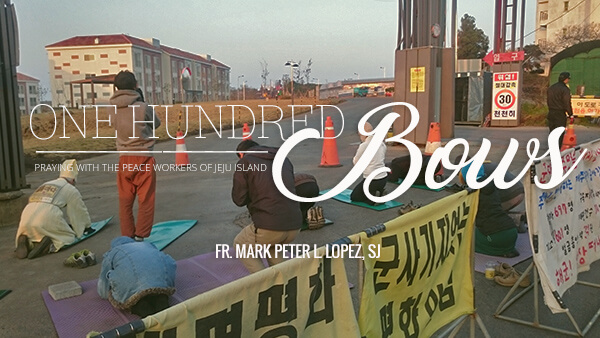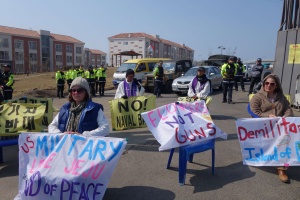


Fr. Mark Peter L. Lopez, SJ
May 19, 2016
One hundred bows. I started my day on Jeju Island with the Korea Province Jesuits and other peace activists there with the prayer of one hundred bows.
We must have looked silly, really, especially to passers-by who might not have understood what we were reverencing. We were, after all, at a protest site, blocking the gate of a nearly-finished, highly-contested naval base in the town of Gangjeong. It was 7:00AM in early spring, which meant it was still uncomfortably chilly. What then, was this motley crowd of 12 or so people, mostly Koreans, one Filipino, and some Americans, doing out in the cold? Why were they on prayer mats strewn by the roadside, prostrating themselves as if a king was passing before them?
We might also not have looked much like protesters – too quiet, and too prayerful to fit the stereotype. But the banners around us, hung from the base’s barbed-wire fences, made the message of peaceful protest loud and clear. “NO to the NAVAL Base. Keep Jeju an Island of PEACE. Protect the ENVIRONMENT.”
Fr. Kim Sung-hwan, SJ, one of the leaders of the movement explains, “We aren’t opposed to naval bases, per se. These are of course, necessary. But why build one on Jeju, when the defense minister himself has openly said the area is not even strategically ideal?”
The people of Gangjeong have long taken pride in having their province declared a UNESCO heritage site for the pristine beauty of its mountain and seascapes. It was, therefore, to the townsfolk’s great dismay, that the natural rock-cliff formations of Gangjeong were blasted away just two years ago, and the coral reefs in the area dug-out, to make way for the port of the base. The pollution resulting from the base’s operations that is expected to further compromise the area also continues to worry so many who will be directly affected.
More painful however, than the environmental destruction that resulted from this project, were the strategies employed by those who pushed for it. “They were divisive and dishonest”, Fr. Kim adds. To this day, officials say that the base will strengthen South Korea’s defenses against the North. How exactly, one can only wonder, given that Jeju is down south and that the base was constructed on the south side of the island. There are allegations also of pay-offs made to town officials who kept their silence long enough for the preliminary groundwork to be done. When the townsfolk, over 90% of whom contested the base, eventually found this out, those officials were impeached, but all a bit too late. Irreversible damage to the environment and to their social fabric had already been done.
Back to our meditation. Over the loudspeaker, a pre-recorded prayer which served as the voice-over to each of our one-hundred bows was played. There were sounds of trickling water, the morning calls of birds, and light meditative music in the background.
Even without understanding a word of Korean, I was moved deeply by the ritual. In the voice of a man who led the first part of the prayers, I heard a resoluteness like that of those who fight the good fight, against all odds. In the voice of a woman which later softened the rite, there was sadness, mourning for what had been lost. And in the voice of a child that followed, there was sincere questioning about what had happened here and how it had come to this, but also there was hope.

Jesuits and Catholic Workers from the United States joining the Gangjeong peace activists for the daily street mass in continued protest of the base.
Before I knew it, I was praying in tears. With every succeeding bow, I felt more and more strongly that we were reverencing the Sacred that was present in the land and sea which had been desecrated by the construction of this naval base, and which will continue to be dirtied by its use. We were reverencing the Sacred by mourning a great loss, and by recognizing the need for healing. We were reverencing the Sacred in the hopes and questions of children about what we will be leaving them behind. It pained me to take part in that service, but it consoled me to think that the Sacred can be found amidst our hurtful and destructive ways. He is there when we mourn. She is there when we detest what is wrong. The Sacred is present when we dream and hope for better, brighter days.
Later in the day there was the street mass also held at the protest site (done peacefully, of course) followed by a free lunch at a nearby make-shift shelter, courtesy of supporters of the movement. There, all the peace activists were welcome and could exchange stories and make friends more freely, without the watchful eyes of the protest police bearing upon us. Later in the evening, there was a town meeting where some of the visitors from the Catholic Workers movement of Dorothy Day who had also joined the morning prayer and street mass earlier in the day, shared about their own peace and advocacy work in America. Many in Gangjeong were already beginning to feel this was all a lost cause. Some of them had been at this for years, and the crowds had already begun to thin. The stories of visitors from so far away, however, visitors who were like-minded and who had communities on the other side of the world who shared the same joys, sorrows and dreams as theirs, brought the Gangjeong townsfolk a lot of encouragement and consolation.
Construction is now almost completed and the base will soon be operational. “What use is there in continuing the protests and organizing such a community of peace activists?” one might ask, given that there is little hope of making a difference.
“What use have we ever had for voices crying out in the wilderness?”, I will say in return. Little, if any, perhaps. But it is they who have taught me to name and reverence where the Sacred is present, to grieve and mourn when it is necessary to do so, and to dream of better ways of moving forward for us all.
Fr. Mark Lopez, SJ, formerly connected with the Environmental Science for Social Change (ESSC) in the Philippines was ordained in April of 2015 and now works as a missionary in Cambodia. Last March 10-19, he visited various Jesuit works in Korea (the Cambodia Mission’s mother-province) to learn from them and to explore areas of collaboration in the work for peace and environmental advocacy.